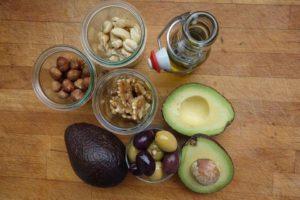You might remember the big to-do over coconut oil this past summer. Suddenly, headlines everywhere were screaming that coconut oil isn’t actually healthy, and you’re deluded if you think otherwise.
Was there some new study that showed this? No, just a new “Presidential Advisory” from the American Heart Association that repeated the same old bad “low fat” dogma advice they’ve been giving for decades: Saturated fat is evil and must be replaced by unsaturated fats in an overall low-fat diet.
 As if your body didn’t need all kinds of fat to do the work it was designed to do. (By the way, if you want to read a really good take-down of the AHA’s
As if your body didn’t need all kinds of fat to do the work it was designed to do. (By the way, if you want to read a really good take-down of the AHA’s propaganda advisory, check out Gary Taubes’ post over at MedPage Today.)
Meanwhile, research has continued to vindicate high-fat diets, saturated fat and all.
One huge study just recently appeared in The Lancet, analyzing data from over 135, 000 participants in 18 countries. The researchers wanted to see how macronutrient intake might affect heart health and overall mortality: Are there significant differences between those who eat high-carb, low-fat and those who do just the opposite?
High carbohydrate intake was associated with higher risk of total mortality, whereas total fat and individual types of fat were related to lower total mortality. Total fat and types of fat were not associated with cardiovascular disease, myocardial infarction, or cardiovascular disease mortality, whereas saturated fat had an inverse association with stroke. Global dietary guidelines should be reconsidered in light of these findings.
Indeed.
And it’s not just epidemiological studies that suggest fat’s virtues in relation to carbs. Several recent animal studies have suggested that a high fat, specifically ketogenic, diet may increase longevity, improve memory, and reduce inflammation in the brain.
Then there’s an especially fascinating report that came out not long ago in the Journal of Lipid Research. Those fats that folks have long accused of clogging the arteries? It turns out they may actually come from the activity of bacteria in your mouth.
Yes, really.
For a very long time, doctors and researchers assumed that the lipids came from eating fatty, cholesterol-rich food. But the research hasn’t borne this out; some people who eat large amounts of the foods we thought were the sources of the fat, such as eggs, butter, fatty fish, and meat, don’t necessarily develop heart disease.
UConn researchers believe they may have solved part of the puzzle. Using careful chemical analysis of atheromas collected from patients by a colleague at Hartford Hospital, they found lipids with a chemical signature unlike those from animals at all. Instead, these strange lipids come from a specific family of bacteria [found in the mouth].
“The marked chemical differences between Bacteroidetes lipids and the human body’s native lipids,” the article continues, “may be the reason they cause disease, suggests Nichols.”
Interesting stuff – and perhaps another nail in the coffin of the diet-heart hypothesis.